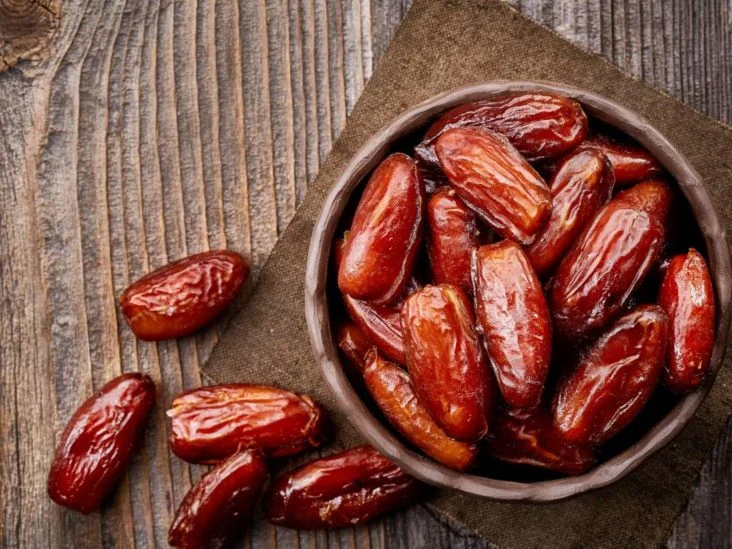Health
How dates increase sperm count and why men should eat them regularly

Chock full of nutrients, people eat dates mostly for energy; but there’s more to these dry fruits.
During Ramadan, Muslims break their fast with dates. Since fasting deprives your body of strength, eating calorie-dense dates helps boost your energy. But apparently, dates are capable of revving up more than just your energy levels.
Science says that date fruits can even crank up your libido; improve your sperm quality and save your marriage. Research has proven what traditional wisdom has been saying all along. Dates boost your sex life by increasing your libido and improving your sexual performance. Also according to science, dates increase sperm count, and this is another reason why men should eat dates often.
How do dates increase sperm count? Have a look at what the research has revealed below.
How Dates Increase Sperm Count
Traditional medicine practitioners used the pollen of the date palm to make an antidote to male infertility. With that background, some researchers decided to investigate the substance of the local antidote.
There was an experimental study led by Bahmanpour et al. in 2006. The researchers discovered that dates did impact sperm and the reproductive system of adult male rats, who were the subjects of the experiment.
The scientists noticed that eating dates greatly improved the count, the motility and DNA quality of the rats’ sperm. It also increased the weights of the testes and epididymis. The credit went to estradiol and flavonoid; components in dates that seem to have a positive effect on the quality of sperm.
Also, in November of 2016, two experts in sexual health in Lagos advised men to eat dates; saying its consumption would enhance their sexual performance and increase their libido.
The man told the News Agency of Nigeria(NAN) that when men took dates appropriately, they could also improve their health conditions in many other ways. It could save them the shame of not satisfying their sexual partners, the experts said.
One of the men, Dr. Aminu Kazeem, a sexual health therapist who works at Energy for Sex Clinic in Lagos; said men who had performance problems should incorporate dates in their diet.
“Eating dates will promote sperm quality and quantity as it is one of the best natural fruits used for male fertility. It also increases the size of the testes in men and the size of breasts in women. Consuming the fruit can help to treat sexual disorders because it is a natural aphrodisiac.”
He further confirmed that dates contained high levels of estradiol and flavonoid which aid sperm motility and increase sperm count.
Dates Increase Libido And Do Other Things For You
Dates do more than increase sperm count and motility. They are good for your all-round health and vitality. Here are some other health benefits of eating dates below:
Maintain your sugar levels with dates
Want to satisfy your sugar craving? Instead of gorging on candies coated with sugar, have a few pieces of dates or sweets made out of it to beat your sugar craving in a healthy way. They are a good substitute for white sugar as they are free of sodium, cholesterol and fats. But remember, their calorific value is higher than other fruits so too much can lead to weight gain.
Dates aid your digestion
These little nuggets are rich in fibre, which means they are good for your digestive system and bowel movements. It also means they prevent the build-up of LDL cholesterol; which can put your heart health at risk by increasing your chances of getting hypertension, stroke, heart disease, etc.
Prevent anaemia
Iron is an essential nutrient your body needs to prevent anaemia. It helps your red blood cells carry oxygen better to various body parts which help in their better functioning. Lack of iron can leave you feeling fatigued even after doing the smallest of tasks. Eating dates can beat this deficiency.
Dates lower your risk of heart disease
Dates contain about 656 mg of potassium per 100g which makes them a powerhouse of potassium. According to WHO guidelines, an adult should consume 3,510 mg of potassium every day. Lower levels of potassium can make one more susceptible to high blood pressure, stroke, etc.
Improves overall health
Apart from all the above goodness, dates are also rich in other essential nutrients like calcium, magnesium and vitamin B6. The body needs both magnesium and calcium for proper bone growth; while vitamin B6 is needed to break down protein, and maintain normal levels of nerve function.
Health
5 symptoms and causes of infertility in men

Trying to conceive a child can be an exciting time, filled with hope and anticipation. But for some couples, it can also be a frustrating journey.
If you’ve been trying to get pregnant for a year without success, you and your partner might be facing infertility.
Infertility is a common condition affecting about 1 in 7 couples and it can affect both men and women. We’ll be focusing on male infertility, what to look out for, and the reasons behind it.
Let’s clear something up first: there often aren’t any obvious signs of male infertility. The main indicator is simply the inability to conceive a child after a year of trying. However, there can be some underlying issues that might cause problems. By understanding these, you can have a more open conversation with your doctor and explore potential solutions.
5 Signs that might point toward male infertility
1. Sexual difficulties
This can include problems ejaculating, low semen volume, erectile dysfunction (trouble getting or keeping an erection), or reduced sex drive. These issues can sometimes be symptoms of hormonal imbalances or other conditions affecting fertility.
2. Testicular issues
Pain, swelling, or a lump in the testicle area can be a red flag.
Healthy sperm production relies on the proper functioning of the testicles, so any abnormalities there might need to be checked by a doctor.
3. Past medical history
Certain medical conditions like undescended testicles (when the testicles don’t move down into the scrotum before birth), infections (including sexually transmitted infections), or surgeries like vasectomy (a procedure for permanent birth control) can impact sperm production or delivery.
4. Lifestyle choices
Habits like smoking, heavy alcohol use, and recreational drugs can all affect sperm quality and count.
Health
Why you’re not losing weight even though you work out

Working out is usually seen as the go-to solution for weight loss. You put in the effort, sweat through the workouts, and expect the scale to show your hard-earned results.
However, many find themselves frustrated when the weight doesn’t come off as expected. This common issue can be disheartening, but understanding why you’re not losing weight despite exercising can empower you to make the necessary adjustments and continue your fitness journey with confidence.
Let’s explore the key reasons why your workout might not be reflecting on the scale.
1. Gaining muscle mass
One of the most positive reasons for not seeing a drop in weight is muscle gain. Muscle is denser than fat and takes up less space in your body. Therefore, as you lose fat and gain muscle, your overall weight might not change, but your body composition is improving. You might notice your clothes fitting better or see more muscle definition.
2. Not drinking enough water
Hydration is crucial for weight loss. Water helps suppress appetite, boosts metabolism, and aids in digestion. When you’re dehydrated, your body might retain water, making you feel heavier. Aim to drink at least half your body weight in ounces of water daily, especially if you’re increasing your fibre intake.
3. Eating more than you burn
Exercise can increase your appetite, and without mindful eating, you might consume more calories than you burn. Even healthy foods can contribute to weight gain if eaten in large quantities. Tracking your calorie intake can help ensure you’re in a calorie deficit, which is necessary for weight loss.
4. Not enough non-exercise activity
Non-exercise activity thermogenesis (NEAT) plays a significant role in weight management. NEAT includes all the movements you do outside of structured exercises, such as walking, cleaning, and fidgeting. If your workouts leave you too exhausted to move much for the rest of the day, your overall calorie burn might decrease. Incorporating more daily movement can boost your NEAT and aid in weight loss.
5. Lack of sleep
Sleep is essential for regulating hormones that control hunger and metabolism. Inadequate sleep can increase levels of ghrelin, the hunger hormone, and decrease levels of leptin, the hormone that makes you feel full. This imbalance can lead to increased appetite and weight gain. Aim for seven to nine hours of sleep per night to support your weight loss efforts.
6. Stress and hormonal imbalances
Chronic stress can lead to elevated levels of cortisol, a hormone that promotes fat storage, particularly around the abdomen. Additionally, certain medical conditions and medications can affect your weight. If you suspect stress or a health issue is hindering your progress, consider consulting a healthcare professional for guidance.
Health
What to eat and avoid when treating malaria

Malaria is a serious disease that affects millions of people around the world. It is caused by parasites transmitted to humans through the bites of infected mosquitoes.
When someone gets malaria, they often feel very sick with symptoms like high fever, chills, headache, and muscle pain. If not treated promptly, malaria can become life-threatening.
However, with proper medical care and attention to diet, patients can recover.
Understanding malaria and its transmission
Malaria is transmitted through the bite of a female Anopheles mosquito infected with Plasmodium parasites.
When this mosquito bites a person, the parasites enter the bloodstream and travel to the liver, where they multiply. After leaving the liver, they infect red blood cells, causing the symptoms of malaria.
Treating malaria
The primary treatment for malaria is antimalarial medication prescribed by a doctor. The type of medication and length of treatment depend on the type of malaria parasite and the severity of the disease. Early diagnosis and treatment prevent complications.
Patients should follow their doctor’s instructions carefully and complete the full course of medication even if they start feeling better.
Foods to eat when treating malaria
Proper nutrition plays a vital role in the recovery from malaria. Here are some foods that can help:
- Fruits and vegetables: Fresh fruits and vegetables are rich in vitamins and minerals that boost the immune system. Oranges, apples, carrots, and leafy greens are excellent choices.
- High-protein foods: Protein is essential for healing and rebuilding body tissues. Include lean meats, fish, eggs, beans, and nuts in your diet.
- Whole grains: Whole grains like brown rice, oats, and whole wheat bread provide necessary energy and fibre, aiding digestion and overall health.
- Hydration: Drinking plenty of fluids is crucial. Water, fresh fruit juices, and coconut water help keep the body hydrated and flush out toxins.
- Soups and broths: Light soups and broths are easy to digest and can be nutritious. Chicken soup, in particular, is beneficial.
Foods to avoid when treating malaria
Certain foods can hinder recovery from malaria and should be avoided:
- Fatty and fried foods: These can be difficult to digest and may cause nausea or discomfort. Avoid fried snacks, heavy sauces, and greasy meals.
- Processed foods: Processed and packaged foods often contain unhealthy fats, sugars, and preservatives that can weaken the immune system.
- Caffeinated drinks: Coffee, tea, and other caffeinated beverages can lead to dehydration, which is not ideal when dealing with malaria.
- Alcohol: Alcohol can interfere with the effectiveness of antimalarial drugs and can also dehydrate the body.
- Spicy foods: Spicy foods can irritate the stomach and should be avoided, especially if the patient is experiencing nausea or vomiting.
Malaria is a serious disease that requires prompt medical treatment and proper care. Along with taking prescribed medication, eating the right foods can significantly aid in recovery.
-

 Health7 days ago
Health7 days agoWhat to eat and avoid when treating malaria
-

 World1 week ago
World1 week agoComputer scientist claiming invention of Bitcoin faces criminal investigation in UK
-

 Politics1 week ago
Politics1 week agoSenator Monguno replaces Ndume as Senate Chief Whip
-

 Celebrities1 week ago
Celebrities1 week agoMohbad’s wife claims Joseph Aloba is her son’s greatest enemy
-

 Politics1 week ago
Politics1 week agoAppeal court affirms Douye Diri as Bayelsa governor
-

 Politics1 week ago
Politics1 week agoActress Hilda Dokubo suspended as Labour Party’s Rivers chairperson
-

 Entertainment1 week ago
Entertainment1 week agoRema’s ‘HEIS’ sets record for biggest opening week on Spotify Nigeria in 2024
-

 Politics1 week ago
Politics1 week agoOndo LP Governorship candidate, Dr Ayodele Olorunfemi promises ₦120k minimum wage if elected


















